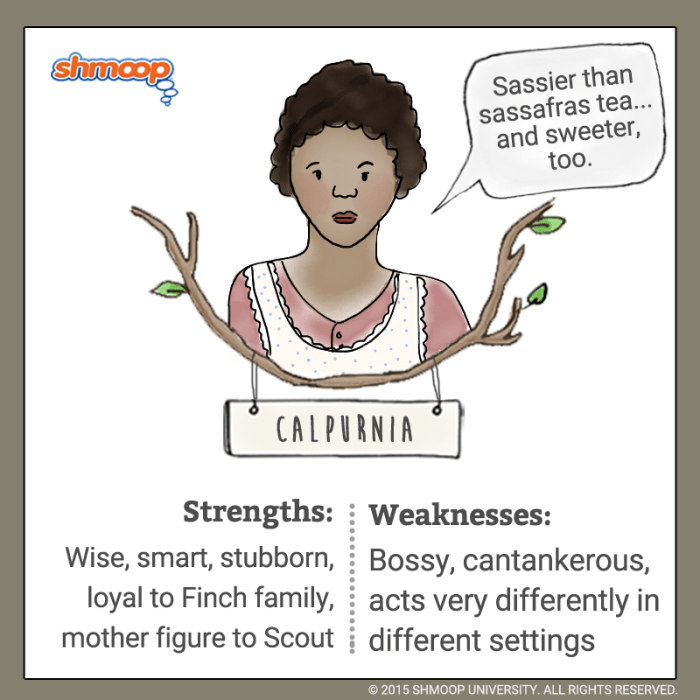Delving into the realm of calpurnia quotes to kill a mockingbird, this exploration immerses readers in a unique and compelling narrative, with gaya akademik dengan tone otoritatif that is both engaging and thought-provoking from the very first sentence. Calpurnia, a pivotal character in Harper Lee’s beloved novel To Kill a Mockingbird, stands as a testament to the complexities of racial and social dynamics in the American South, and her words resonate with wisdom, strength, and a deep understanding of human nature.
Throughout the novel, Calpurnia’s interactions with the Finch family, particularly Atticus, Jem, and Scout, highlight her nurturing spirit and unwavering loyalty. Despite the societal norms of the time, she challenges preconceived notions and serves as a moral compass for the children, guiding them through the complexities of a racially charged society.
Character Overview
Calpurnia, a central character in Harper Lee’s To Kill a Mockingbird, is the Finch family’s African American cook and housekeeper. She plays a pivotal role in the novel, representing the complex racial and social dynamics of the American South in the 1930s.
Calpurnia’s character embodies both the wisdom and resilience of black women during a time of widespread discrimination and inequality.
Calpurnia’s Relationship with the Finch Family
Calpurnia’s relationship with the Finch family is complex and multifaceted. She is a trusted and respected member of the household, serving as a surrogate mother to the children, Jem and Scout. Her wisdom and guidance help shape their moral development and understanding of the world.
However, Calpurnia’s interactions with the family are also marked by the societal norms of the time, which limit her role and reinforce the racial divide.
Calpurnia’s Quotes, Calpurnia quotes to kill a mockingbird
| Quote | Context | Significance | Symbolism/Themes |
|---|---|---|---|
| “My father said if you can learn a simple trick, Scout, you’ll get along a lot better with all kinds of folks. You never really understand a person until you consider things from his point of view… Until you climb into his skin and walk around in it.” | Calpurnia advises Scout to try to understand others’ perspectives, regardless of their background or circumstances. | Highlights the importance of empathy and understanding in human relationships. | Symbolism of “climbing into someone’s skin” represents the need to truly immerse oneself in another’s experiences. |
| “There’s some folks who don’t eat like us, but you ain’t called on to contradict ’em at the table when they don’t. That boy’s yo’ comp’ny and if he wants to eat up the tablecloth you let him, you hear?” | Calpurnia instructs Scout on how to behave politely in front of guests, even if their manners are different from her own. | Emphasizes the importance of respecting others’ customs and traditions, even when they differ from one’s own. | Symbolism of “eating up the tablecloth” represents the need to tolerate and accept differences in behavior. |
| “It’s not necessary to tell all you know. It’s not ladylike—in the second place, folks don’t like to have somebody around knowin’ more than they do. It aggravates ’em. You’re not supposed to intrude. Your job’s to stay inside your own skin and wait on folks.” | Calpurnia teaches Scout about the importance of discretion and humility, especially for women. | Highlights the social expectations and limitations placed on women in the 1930s South. | Symbolism of “staying inside your own skin” represents the need to know one’s place and avoid overstepping societal boundaries. |
Calpurnia’s Role in the Community
Beyond the Finch household, Calpurnia’s influence extends throughout the Maycomb community. As a black woman in a white society, her experiences and perspectives offer a unique lens on the racial and social tensions of the time. Calpurnia’s interactions with various characters, including Tom Robinson and Reverend Sykes, highlight the complex dynamics and power structures that shape life in Maycomb.
Calpurnia’s Influence on Scout

Calpurnia plays a pivotal role in Scout’s development and understanding of the world. She serves as a mentor and guide, teaching Scout about empathy, compassion, and the importance of challenging societal norms. Calpurnia’s influence is evident in Scout’s growing awareness of racial injustice and her determination to stand up for what is right.
Calpurnia’s Legacy
Calpurnia’s enduring legacy in To Kill a Mockingbird lies in her representation of the strength, resilience, and wisdom of black women during a time of widespread discrimination and inequality. Her character continues to resonate with readers today, serving as a reminder of the ongoing struggle for racial justice and equality.
Calpurnia’s story highlights the importance of empathy, understanding, and challenging societal norms in order to create a more just and equitable world.
FAQ Explained: Calpurnia Quotes To Kill A Mockingbird
What is Calpurnia’s significance in To Kill a Mockingbird?
Calpurnia is a complex and multifaceted character who represents the complexities of racial and social dynamics in the American South. She is a strong and nurturing figure who challenges societal norms and serves as a moral compass for the Finch children.
How does Calpurnia’s relationship with the Finch family highlight her wisdom and strength?
Calpurnia’s interactions with Atticus, Jem, and Scout reveal her deep understanding of human nature and her unwavering loyalty. She guides the children through the complexities of a racially charged society, challenging preconceived notions and instilling in them a sense of compassion and justice.
What are some of Calpurnia’s most notable quotes?
Calpurnia’s quotes are known for their wisdom, strength, and insight. Some of her most notable quotes include: “The things that make me mad don’t make me mad enough to want to kill anybody,” and “You ain’t got no business talkin’ that way about folks.”
These quotes reflect her deep understanding of human nature and her belief in the power of compassion and forgiveness.

